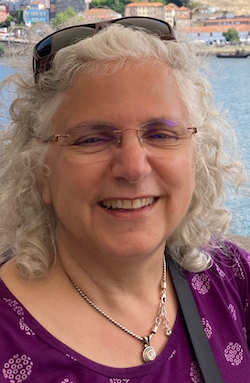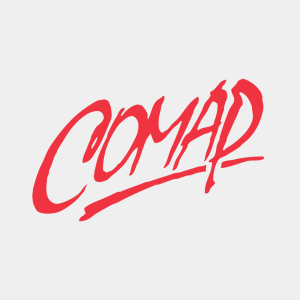In Their Own Words: Anne Dougherty, Mathematical Modeling Contest Advisor
Team advisors are a critical part of our math contests, acting as the main point of contact for the team, preparing the team to compete, and helping ensure the team follows the contest rules and regulations. Advisors have a front-row seat to the competition, giving them a unique perspective of the process.
In this post, we get a behind-the-scenes peek from Anne Dougherty, Associate Chair and Teaching Professor at University of Colorado Boulder.
Interview with Anne Dougherty
Anne Dougherty is a Distinguished Teaching Professor in the Department of Applied Mathematics at the University of Colorado Boulder. She is also the Associate Chair of the department and a faculty advisor. Together with other departmental faculty, Anne has been advising MCM/ICM teams each year since 1997.
 COMAP: How long have you been involved in COMAP contests (and in what capacity)?
COMAP: How long have you been involved in COMAP contests (and in what capacity)?
DOUGHERTY: I arrived at CU Boulder in 1994. To the best of my knowledge, our department had one MCM team in 1992. I did not get involved with the MCM/ICM until 1997 when I recruited several students to participate. I have been responsible for recruiting students to participate in the MCM/ICM since that date. We have had at least two or three teams every year since 1997.
COMAP: How do you encourage students to get involved?
DOUGHERTY: I am a faculty mentor/advisor for the undergraduate Applied Math majors in our department. I always talk about the MCM/ICM contest at our recruiting events and when I talk with individual students. We have established enough of a tradition at CU that students are usually aware of the contest. I also email information about the contest and our training sessions to all our majors and minors. In turn, those students forward to their friends. We encourage students from all STEM majors to participate. The best teams frequently have students with a variety of backgrounds.
COMAP: What are some of the benefits of participating in our contests (for you and for your students)?
DOUGHERTY: The contest is extremely beneficial to our students. I tell them it is similar to a mini-research project: learn about the problem, do research on what has been done in the past, create a mathematical model, obtain numerical results, and share the results through a well-written report. Students are always amazed at how much they can accomplish in 4 days of focused work. They appreciate the intensity and the ability to work closely with others. I believe it gives them additional confidence in their other coursework.
Other benefits to students: they can add this to their resume, and they can discuss the contest with interviewers when they are looking for internships and permanent positions. The contest is an “academic extra” that goes beyond classwork. Employers see the contest problems as similar to problems that might arise in industry, where the problem is open-ended, and a solution is needed in a short timeframe.
I want all our students to be successful. I view the contest as one opportunity on that road.
COMAP: What tools, resources, and processes do you use during the contest period?
DOUGHERTY: Three months prior to the contest, we begin to advertise to our students. Initially, we have one or two informational sessions to discuss the MCM/ICM and to go over the rules. We encourage students to start forming teams.
We also have several training sessions. In the training sessions, teams of students get together and go over a previous contest problem. They discuss the problem amongst themselves and brainstorm ideas on how to solve it. If it is a problem that was done by one of our teams, we might review that team’s solution paper. We also discuss strategies for working as a group, dividing the tasks amongst the team members, getting an early start on writing of the report, etc.
One of the best resources is to review the Judges’ Commentary in the UMAP Journal. The judges provide excellent feedback on the many contest papers they reviewed. They provide specific information on what teams did well and where they could improve. We always make sure we go over this information with our teams during the training sessions.
During the contest period itself, we don’t provide any resources. We guide the students beforehand on setting up a good place to work, updating their software, maybe learning LaTeX. But once the contest begins, we tell the teams they are on their own!
COMAP: What tip(s) can you share with future advisors?
DOUGHERTY: There is a substantial amount that has been written about the contest and training successful teams. Future advisors should read through that and share it with their teams. However, I believe it is important to share the strategies with the students over multiple training sessions, not all at once. Ideally, it’s great if teams will participate for more than one year. They tend to learn and improve each time they do the contest.
COMAP: Do you bring math modeling into the classroom? If so, how?
DOUGHERTY: Our department is the Department of Applied Mathematics. We have projects in several of our upper-division courses. These projects frequently have both a modeling component and a numerical component. We also have a couple of elective courses, one of which focuses on physical modeling and the other on modeling in mathematical biology.
About COMAP’s Mathematical Contest in Modeling (MCM)® Math Contest
COMAP's MCM/ICM are international contests for high school students and college undergraduates. The contests challenge teams of up to three students to analyze, model, solve, and present solution reports to an open-ended application problem. In these contests research, analytics, and creativity are just as important as time management and problem selection.
Written by
COMAP
The Consortium for Mathematics and Its Applications is an award-winning non-profit organization whose mission is to improve mathematics education for students of all ages. Since 1980, COMAP has worked with teachers, students, and business people to create learning environments where mathematics is used to investigate and model real issues in our world.
